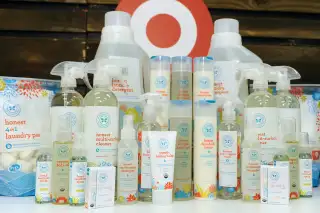Here's What You Don't Know About 'Natural' Cleaning Products

Since a lot of consumers are concerned about exposing themselves and their families to harsh chemicals in cleaning products, there has been growing demand for gentle, natural alternatives.
But as it turns out, just as there is no clear definition of what "natural" foods are, the meaning of "natural" is vague when it comes to ingredients in common items like countertop cleaners, laundry detergents and even toothpaste. Consumers often take a leap of faith when they buy — and pay a premium for — natural cleaning products.
"There are no regulatory guidelines for what makes a household product 'natural,'" the Wall Street Journal reported in an analysis of ingredients of conventional cleaning products and their natural sister brands produced by the same parent company. The main ingredients in both can be very similar chemically, regardless of whether they're derived from petroleum or plant-based sources.
If that's not frustrating enough for shoppers trying to go green, the Journal also pointed out that "natural" cleaning products can cost a lot more than the conventional products sharing shelf space with them. The "natural" option can sometimes cost more than double the product that's essentially made with the same ingredients.
What makes it so confusing for consumers is that there isn't a lot of regulation over companies' use of the word "natural" on cleaning products or items like disposable diapers.
But when facing legal threats, some companies have quietly dialed back their "natural" claims. Last month, Jessica Alba's Honest Company — which found itself deflecting user claims last year that its "natural" sunscreen didn't work — was sued for what plaintiffs said were "deceptive" labels that marketed the products as all-natural.